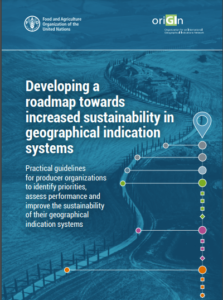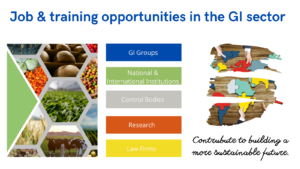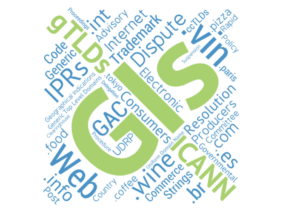 Over the years, GIs have generated increasing interest with respect to sustainability.
Over the years, GIs have generated increasing interest with respect to sustainability.
On the one hand, the evolution of “societal” values, consumers’ perceptions and trade regulations are pushing all economic sectors – including agricultural and food value chains – to rethink their business models. One of the main challenges of today’s economies is to continue to generate value – providing for the needs of a growing world population – pursuing at the same time social and environmental objectives.
On the other, long before civil society and policymakers started to question companies and brands concerning their impact on the welfare of their employees and communities as well as on the environment, GIs – by their very nature – have been sensitive to sustainability issues. For example, if one thinks about the fair value distribution for all relevant operators along the value chain, GI products have performed well in remunerating primaries producers, often penalized by negotiation dynamics with the retail industry. Likewise, as GIs cannot be delocalized (they embody specific natural and human characteristics of their areas of origin), specific attention is often paid to avoid soil degradation and biodiversity preservation.
This does not mean that GIs are sustainable by definition with respect to the latest standards. But rather that they are in a privileged position to respond to the emerging challenges. In this respect, the recently approved EU Regulation on geographical indications for wines, spirits and agricultural products recognizes that sustainability has an economic, a social and an environmental component; that GIs can play an important role in terms of sustainability, including in the circular economy; and sustainable practices can be included in GIs’ product specifications.
Several associations in charge of GIs around the world are working towards further improving their sustainability performance.
In certain circumstances, however – especially for GI associations in developing countries and in disadvantaged areas in high income countries – navigating the complexities of those issues is a challenge for producers and business operators.
To respond to this, since 2016, the Food and Agriculture Organization of the United Nations (FAO) and oriGIn have been collaborating on sustainability and GIs. Several tools – such as “Practical guidelines for producer organizations to identify priorities, assess performance and improve the sustainability of their geographical indication systems”, a toolkit to help data processing, and a database listing over 400 sustainability indicators relevant to GIs – have been developed for producers and other operators within GI value chains to elaborate their own sustainability roadmap, through a participatory and inclusive process: https://www.origin-gi.com/20-03-2024-origin-and-the-fao-launch-the-publication-developing-a-roadmap-towards-increased-sustainability-in-geographical-indication-systems-guidelines-and-toolkit/
The guidelines and toolkit provide GI organizations wishing to engage in a sustainability journey with a practical methodology to:
- Prioritize local economic, social, environmental and governance topics to be addressed;
- Assess the current performance in the identified priorities through a set of indicators; and
- Improve performance through targeted initiatives, in partnership with potential allies.
We believe such practical tools will be useful for GI groups around the world at different stages of their sustainability journey. They can be used to elaborate their sustainability roadmap or simply to compare and evaluate their current strategy, through a participatory and inclusive process involving the relevant stakeholders in geographical areas. As an example, with the support of the Swiss Federal Institute of Intellectual Property (IPI), such tools are being used in Peru to develop a sustainability strategy for the GI Café Villa Rica.
If your institution (GI group – individually or at the sector level – donor, research center, public authority … ) is interested in engaging with us on GI and sustainability, please do not hesitate to contact our Managing Director at massimo@origin-gi.com .


